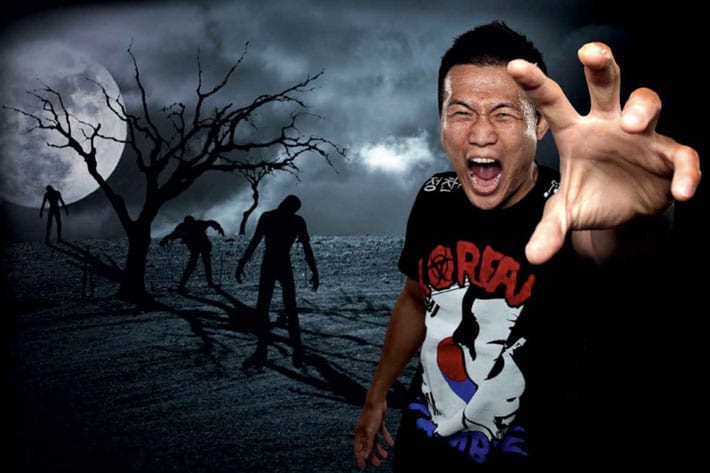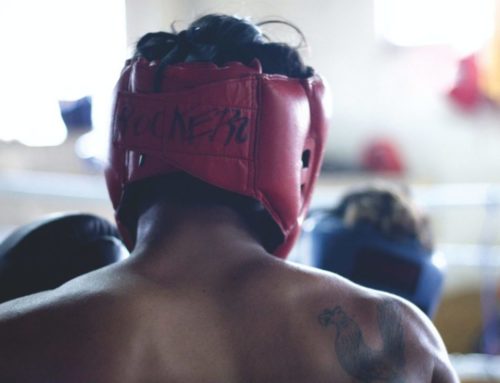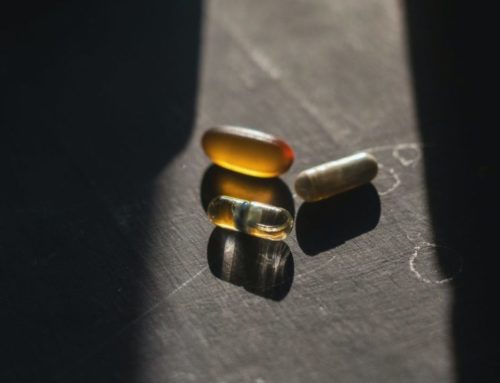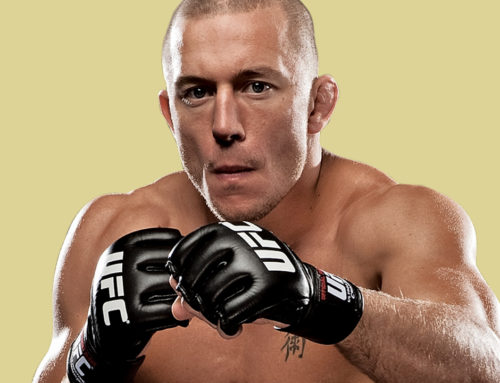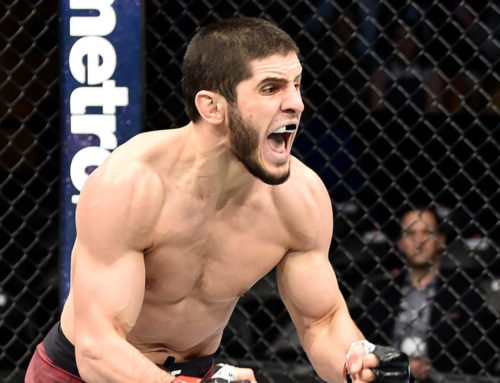The apocalypse has arrived. The reign of the undead is upon us. Chan-Sung Jung is out for blood
From shy, lonely and unable to make friends as a kid, to adored by MMA fans the world over. This is the remarkable story and rise and rise of the featherweight fighter whose actual name many fans either don’t know, can’t pronounce, or can’t even remember. He is simply known as ‘The Korean Zombie.’
Styles make fights, as the old adage goes, but styles also make fighters. And once seen, the battler who will not be denied is unforgettable. Chan-Sung Jung, the one-time kickboxer turned South Korean mixed martial arts superstar has become one of the most popular warriors in the Ultimate Fighting Championship.
The epithet The Korean Zombie has come from his resistance to strikes and his ability to continue to move forward and fight aggressively under pressure. It’s the same characteristic that made the most popular former champions great – the likes of Wanderlei Silva and Chuck Liddell.
Yet Jung (it feels almost weird calling him by the familial name) has a vast arsenal at his disposal. Witness the twister submission against Leonard Garcia, the D’Arce choke finish of Dustin Poirier in his latest outing Couple that with an intense, steely toughness and we are witnessing the emergence of a special force in the 145lb division.
Outside the cage too, his t-shirts are currently the hottest property in the industry, whilst he’s mobbed wherever he goes, from Soeul to San Diego. And now there is a growing cavalcade calling for him to face José Aldo, the Brazilian at the top of the world’s featherweight rankings.
It is the formative experiences in Chan-Sung Jung’s childhood that appear to have molded the man we now witness, a fighter who is consistently upsetting the odds in the UFC’s 145lb division.
He was born in rural Pohang, a port known for its steelyards and shipbuilding, in 1987, and he moved to Nam Yang Ju, a satellite city of Seoul when he was in his mid-teens. Prior to meeting him in Las Vegas, the story was simply that due to his size (small as a kid) and the fact he had grown up in the countryside, he was bullied and mocked by his classmates when he moved to the more urbane setting of Nam Tang Ju. But Jung reveals that his upbringing was much more complex. He had an unusual early life, to say the least.
He got into fights because of the bullying, and usually lost. Yet no one could break him. It was then that his aunt, whom he reveals to was a strong and domineering character who could see only the best for the nephew she loved, demanded he begin classes at a nearby Hapkido dojo, learning the locks holds and techniques of a sport adapted by returning Koreans from Japan.
In an exclusive, in-depth interview in Las Vegas, ‘The Korean Zombie’ opened up to <Fighters Only>, revealing details about his early life which had his translator and friend Brian Rhee at various points both laughing and raising his eyebrows at some of the facts and views he too had never heard before from his associate.
Jung believes the most germane moment of his teenage years was at 15. It’s the moment when he ‘awoke’ physically. “I was 15 years old and I was in high school, I began kickboxing. I had an incredibly scary coach, who was very tough.” And the authoritarian figure was just what he had been looking for, he admits: “That was really the time when I started to push myself and be pushed physically. That’s the memory that sticks out to me the most.”
But what about before that? What are his memories before 15? Was he poring over martial arts events? “Not really. I didn’t really do anything physically when I was younger. I started Hapkido when I was 14, but before that I wasn’t physically active.” He paints a picture of his life as a child. “There wasn’t anything in particular that I enjoyed when I was young. I was just a typical kid who played video games. I was quite weak as a child, and that’s why my aunt pushed me to get into martial arts.
“There wasn’t any particular illnesses, but when I was in middle school I wasn’t a big guy. I was always small for my age. In elementary school, I was average height, but by middle school I was shorter than everyone else.”
Born in Pohang as an only child, his parents were so busy working, he spent long periods living with a neighboring family until the age of eight. “When I was younger, I didn’t have many friends so I was alone a lot of the time,” he confesses. “My parents were busy working, so I spent a lot of time alone. I didn’t have any brothers or sisters either. Up until the age of seven, I lived with another family. My parents were just so busy that I stayed with this family. When I was younger, I actually thought that they were my parents but they were just a family that my parents knew.
“When I turned eight years old, I went back to living with my parents, but they were still incredibly busy. Pohang is a port city and is very well known for producing steel. My father was involved in that industry, and my mother owned a clothing store.”
So, he was forged by a man of Korean steel? “My father wasn’t particularly strong and he didn’t do any of the heavy lifting or anything like that. He would put stuff in and take stuff out of the ovens, so it was just a really hot job.
“It was the type of job where you have to work a lot and there wasn’t regular hours so you had to work overtime and do the graveyard shift. He wasn’t around too much, because he was working so much.”
Meanwhile, the store his mother ran was actually in another city. “I’m not particularly sure what type of store my mother owned. She worked and lived in a city called Daegu. They lived separately for a while, which isn’t uncommon in Korea. For us, the job is the most important thing.”
The enforced absence of his parents had an inverted effect of Chan-Sung. He was introverted. “Because I was alone a lot and I didn’t have any self-confidence, and when I was around people I didn’t talk much. I was very shy. That’s one of the reasons why my aunt wanted to get me involved in sports. To build up my self-confidence. Yet once I started getting involved in sports, I began to grow a lot taller and grow physically. That was a big step for me.”
Even today, there is something of a reluctance on the part of The Korean Zombie to speak out more than he is asked. It is part cultural, of course, but his face reveals little as he continues to explain his childhood properly for the first time in a magazine interview.
It rings true that when he moved to Nam Yam Ju, his classmates made fun of him because he was from the country. And it was that lack of acceptance that drew him into playground skirmishes. “In South Korea, middle school is three years and high school is three years. So throughout middle school I didn’t have any friends. I was alone a lot. Then moving to Nam Yam Ju, not growing up with them and being from the country, I did get into fights during that time. I was an outcast. That’s really what spurred my aunt into getting me into athletics and martial arts.”
Bottom line was that of insulted, he would fight for his honor. Even if he was going to get beaten, which he says was more often the case. “I don’t really remember the dynamic that was going on because I was still a kid at this point. I do remember coming up from the countryside and having an accent because I’m from a different region. Kids being kids, they naturally picked on me.”
Forced into going to Hapkido classes by his aunt, he reasons, was a major turning point in his formative years. “My aunt has a very domineering personality [he laughs]. At this point, I was living with her for a very short period of time. When she told me that she wanted me to do it, I didn’t even think to not want too.
“At the beginning I found it boring, but eventually I started to get into it and embrace it.” He remains grateful to her for persisting with him, an act which opened the floodgates for his physicality. “I’m very thankful to her. She’s one of the most influential people in my life, so whenever I do interviews I always mention her. In Korea, there are several big holidays throughout the year and these are times when the family gather together, so I at least get to see her at least a few times a year.”
Some people, who were bullied when they’re young, even though they come out stronger at the end of the day, have revealed illness whilst it’s going on, even thoughts of suicide. But for Jung being alone wasn’t anything knew, and he didn’t have the social skills to mix very well anyway.
He says: “I wasn’t really depressed and I didn’t have suicidal thoughts. It wasn’t that extreme. I was alone so much at a young age that it almost felt more comfortable for me. I was more comfortable being alone as I didn’t have the experience of getting along with people and being social. I felt isolated, but in a way I did feel more comfortable.”
Looking back on that period, the hardship he experienced as a child, reflectively, he believes, it has made him a stronger person today. “I’d say that it definitely made me stronger. When I look back at myself then and I compare it to who I am now, I’ve changed so much. I still have an element of the shyness in my personality. There are times when I like to be alone and I don’t like to talk a lot. The fact that I’m now the person that I am today though, was formed by those experiences.”
Amazing that in those early years, the prospect of his fighting in the most elite fight sport on earth could not have been farther from his mind. “No, I definitely didn’t expect to be here and never even thought about it. I don’t think anyone else would have expected it or been able to predict it, either. Even when I got into high school and I started kickboxing, I actually thought that I wanted to get into K1 because it was the premier sport in Korea and was very popular at the time. But the more I got into mixed martial arts, UFC became a serious thought.”
The rest is down to hard work, and graft. The Korean Zombie had found his métier. At 18, he joined a kickboxing gym. In June 2007, he turned pro, and finished the victor in a Sambo tournament arranged by the Korean Sambo Association, and in December of the same year, won the lightweight division of the Pancrase Korea Neo-Blood Tournament.
Six months later, he was the Korean champion at 65kg as an MMA fighter. Progress since then has been rapid, as opponents and promoters discovered that Jung belongs at the highest level. Success in Deep and Sengoku followed, the latter where he was first known as Zombie.
He crossed the Pacific 30 months ago to join the WEC, but suffered two losses in his first outings – to Leonard Garcia and George Roop. But since then, things have changed. Gone has the wildness. In its place a more dangerous prospect – a technical Zombie, using his full skill set. He avenged his defeat to Garcia, took out Mark Hominick in seven seconds with a ruthless knockout, and then submitted Dustin Poirier, a much-fancied prospect, by D’Arce choke. Stupendous. And, in four out of five WEC and UFC fights, Jung has won ‘Fight of the Night’ (twice), ‘Submission of the Night,’ ‘Knockout out of the Night,’ and included in that – the first twister in UFC history in the rematch with Garcia, which earned him the Fighters Only World MMA Awards ‘Submission of the Year’ award in 2011.
And, best thing is, Jung reckons he’s only just got started. He has completely rejuvenated his career in the UFC, devouring three extremely tough opponents with one-sided performances. And he puts the revival solely down to one moment, one night, one fight, one painful defeat.
“For me, I can very clearly define the moment as being ‘before George Roop’ and ‘after George Roop,’” he offers. “If you look at the fights, you can see that at that point, things began to change for me and my fighting style, the way I think about the sport and the way that I approach things.
“The way I fight now is that I still have the passion and the fire in my heart, but I also want to keep a cool head. That’s really the biggest difference. I’ve changed the way I approach a fight since that knockout [at WEC 51]. That knockout wasn’t just a blow to my self-confidence it completely destroyed it. I had to build my game back from the ground up.”
Yet while his mindset has changed, the fighter still burns brightly within. Jung adds: “Up until the George Roop fight, brawling and fighting was fun. I liked to do it and I enjoyed it. More recently, as my thoughts on fighting have changed, so have my goals. A lot of really good, really fortunate things have happened in my life and that’s all thanks to fighting, and the sport.
“Without fighting, none of that would be possible. As far as a career and fighting for a long time, I don’t know if that’s possible. Even at this point in my career, I’ve got injuries, aches and pains all over the place. I don’t know if I’ll be able to fight until I’m 35 years old. That’s something that is on my mind these days.
“What I would like to do is fight for the title quickly, become the champion and defend it a bunch of times. I want to get there as quickly as possible.” Go, Zombie, go. For as long as it lasts, we will all cherish the ride along with you.
* ‘The Korean Zombie’ Chan-Sng Jung returns to the Octagon this weekend at UFC Houston, taking on Dennis Bermudez in the main event. Check local listings for start times.
This cover interview first appeared in the September 2012 issue of Fighters Only magazine.

